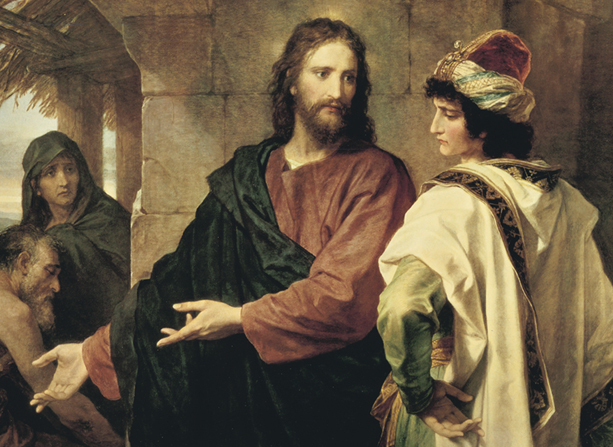Both pro and con arguments about infant baptism have been going on for centuries and will likely continue until Our Lord returns. Many learned men from every age have addressed this subject, who are far superior in knowing what was recorded by the early church fathers than I. But relying on the spirit, I will address this subject to bridge the tensions surrounding this subject.
Let me begin by conceding that some early Christians practiced infant baptism. But to what end, and for what purpose? As we look back, we must be careful not to make too many assumptions regarding this practice, or any other practice for that matter. Since the records of the early church fathers are few, it would be foolish to assume all Christians participated in certain rituals and forms of worship.
Likewise, those previously mentioned written records are not profoundly direct in the purpose of the ritual of infant baptism (other than it was practiced by the early church’s). Still, they only relay references to infant baptism, and some of them are very vague. We will review some of those references by the early Christian writers to see if we can glean more insight.
Some denominations, specifically the Latin Church, today insist the practice of infant baptism was not only an established ritual, since Apostolic times, and practiced by all Christians. Yet, using those same references, we will see that the practice of infant baptism was not universal. For Example, Tertullian (On Baptism 18) writes:
“According to the circumstances and disposition, and even age, of each individual, the delay of baptism is preferable; principally, however, in the case of little children. … The Lord does indeed say, “Do not forbid them to come to me.” Let them come, then, while they are growing up! “
Next, We will examine the New Testament references used by some to support infant baptism doctrine, but be aware that there is no deliberate nor written instruction regarding infant baptism in the New Testament. When considering traditional rituals, we must be cautious that we don’t find ourselves guilty of placing the cart before the horse, as it were.
When researching the validity of traditional Christian practices, we must compare the tradition will the scriptures. We must not fall into the error of searching the scriptures for words and phrases to support the doctrine we try to defend. But instead, examine the traditional practice in light of the scriptures, and test its validity and worth. Let us not yank scriptures out of context in defense of a tradition, and let us not read into the scriptures something that is not there, as in the case of Acts 16:15.
“And she and her whole household had been baptized….”
A fantastic event to be sure, as with anyone, or any family, accepts Jesus as Lord and savor. Yet this verse yields no details about any other specifics of Lydia’s household. It doesn’t reveal how many persons were in this household, nor their sexes or ages, and if Lydia had a husband or children. We can see that this verse’s use to support the tradition of infant baptism has no value. The same applies to Verse 33.
When we look back some 2000 years, we look through the lens of life as we know it. Today we think of a household as a nuclear family; father, mother, and children. But in biblical times, as Jewish history shows, family units commonly contained several family members beyond husband, wife, and young children. It was not uncommon for unmarried adult men or women to remain in the house of their parents.
Some early Christian writers seem to accept infant baptism as a normal rite of the church. We see this attitude in the writings of Cyprian from the 3rd century. Although the following discussion centered around a disagreement about the day of infant baptism, it still illustrates the fact of accepted practice. From Cyprian 58, we read:
“But in respect of the case of the infants, which you say ought not to be baptized within the second or third day after their birth, and that the law of ancient circumcision should be regarded, so that you think that one who is just born should not be baptized and sanctified with in the eighth day, we all thought very differently in our council.”
Yet even from these opposing references, it is not established when the church began the practice exactly. Those in support of the rite say it was from Apostolic times; others say the church incorporated it after the Apostolic age. So let’s look at the writings of Justin Martyr (mid 150’s AD):
“And for [water baptism] we have learned from the apostles this reason. Since at our birth we were born without our own knowledge or choice, by our parents coming together, and were brought up in bad habits and wicked training; in order that we may not remain the children of necessity and of ignorance, but may become the children of choice and knowledge, and may obtain in the water the remission of sins formerly committed.”
Here we find no reference to infant baptism; quite the opposite, we could say, based on this, around 150 AD, infant baptism was not a universal practice among early Christians. The Oxford Dictionary of the Christian Church can accurately trace infant baptism back to the 3rd century, 200 AD to 300 AD(pgs. 689-690). Let’s continue our journey.
If we again look at Cyprian’s discussion, we find the subject of infant baptism centered around the remission of the original sin. This belief was; a child didn’t lose their innocence and become sinful for the first 2-3 days of life. So we begin to understand where the contention over infant baptism began, how symbolism becomes doctrine, and the confusion of the two leads to errs in the faith and our Lord’s instruction.
To stay on course and not wander off this current subject to another subject entirely, we must restrict ourselves into hitting a few high points, as it were, leaving the reader to do further research on original sin on their own. From where did this idea of innocence for the first or three days come? Jewish oral law (or oral doctrine) states the establishment of life doesn’t commence until after 48 hours. Hence accountability for the life of sin begins after 48 hours.
On the other side of Cyprian’s discussion, the proposal of infant baptism performed on the eighth day aligns with the Old Testament. The 8th day marked the date of the Circumcision of Jewish male children. Why the 8th day? The 8th day is the day of miracles, which if we are paying attention, we will recognize that our Lord rose from the grave, defeating death, paving the way of salvation, on the 8th day, the day of miracles.
We must tread slowly and lightly, lest we confuse symbolism with salvation, which causes division among the brethren. Before we continue our journey, it is crucial to lay a foundation on which to tread.
We are saved by grace, through faith, that Jesus is the Son of God who paid the price for our sins by offering himself a living sacrifice on the cross, and that he rose from the dead on the third day, overcoming death, and providing the way of salvation to all who believe.
I know we are all tempted to add to, or take away from, this foundation and run with it to the safety of our own denominational beliefs, yet I would ask you to maintain patience and stay the course. I remind you of a verse from I Corinthians 2:2 where the Apostle Paul says:
“For I determined to know nothing among you except Jesus Christ and him crucified.”
He said this to the believers at Corinth to put a stop to the arguments over doctrine. He was telling them acts of symbolism are not faith and do not provide salvation. Symbolism is symbolism, the image of things not seen. While they represent things of the spirit and add understanding of spiritual matters, they do not provide salvation nor remission of sins.
Does circumcision make one a Jew? No.
Does baptism make you a Christian? No.
Can you provide salvation to or for anyone by any action? No.
If you thought yes to the first two statements, your answer to the third is yes, and you have erred from the faith. You have assumed the sacrifice of the cross is insufficient for salvation by adding your action and elevated symbolic acts to provisions of salvation.
The elevation of the ritual of baptism to becoming a necessary act of salvation happened sometime around the end of the 2nd century. At this point, the doctrinal arguments began as to what exactly infant baptism represents versus its role in salvation.
Baptism is a symbolic ritual, a public profession of faith in God, and represents the washing away of the old life of sin. We now arrive at the actual administration of baptism. If the ritual of baptism were necessary to salvation, you would think its ritual performance would be identical in every area. What is that way?
Originally baptism was performed by immersion. Symbolizing the death to our old life of sin and resurrected to a new life in Christ. Just as it represents the death and resurrection of our Lord Jesus, so if baptism is a requirement of salvation, was the administration of it altered by the early church? When did sprinkling of water on the head become the same as immersion?
This difference indicates that those administering the act of baptism were very sloppy, or more likely, they knew it was symbolic, and therefore could be modified to accommodate variables such as age and climate. For instance, in northern Africa, generally, Christian converts were baptized naked. They didn’t want to enter into their new life wearing old clothes, and the climate was conducive to this way of baptism.
In Rome (or northern Italy), the colder climate prohibited baptism in this way and adjusted to being clothed during baptism. The further modification took place with the elderly, young children, or infants, to just sprinkling. In the Eastern Churches (in western Asia), infants were administered the Eucharist (the Lord’s Supper) right after baptism.
Their reasoning would follow since the observance of the Eucharist was one of the commandments of our Lord Jesus instituted for his followers. The administration of the Eucharist to infants was rejected by the Latin church in the later 3rd – early 4th century. This change leads us to the next step in our journey: the administration of baptism and the age of accountability.
The pedobaptists (those who believe in infant baptism), in their defense of the practice, often site Mathew 19:14
“But Jesus said, “Leave the children alone, and do not forbid them to come to Me; for the kingdom of heaven belongs to such as these.”
Using this verse to support infant baptism is a stretch, the conclusion of the pedobaptists being if you deny infant baptism, you are forbidding the children to come to the Lord. Yet, there is no mention of anyone bringing an infant to Jesus in this portion of the gospel.
So when do children ‘come’ to the Lord? If we consider the practice of Judaism, in which baptism has its roots, we find the age of accountability for Jewish children is 13. So coming ‘to the Lord’ would be somewhere between 48 hours old (the establishment of life) to the age of 13, day one. Some children come to the knowledge of salvation far before the age of accountability.
And it was those children our Lord was referring to in this verse. ‘Do not forbid then to come because of their age.’ My children and grandchildren came to know the Lord and were baptized way before the age of accountability. We find in the early Christian writings; some followers came to the knowledge of our Lord as children.
Polycarp, just before his death, said;
“eighty and six years have I served him, and he never once wronged me; how then shall I blaspheme my King, who has saved me?”
Polycarp believed himself to be a follower of Christ since childhood. There were others, but I will leave you to research those on your own.
So we return to the disposition of children’s souls, not baptized as infants, and die as either infants or young children. If you think these are in danger of condemnation, then you have understood none of the teachings of our Lord and have erred from the faith.
The price paid by our Lord’s sacrifice on the cross was for the sins of all men.
We serve a just and righteous God, and the disposition of the souls of those infants and children, I leave in His hands by faith. Only an arrogant, self-righteous individual would dare condemn the innocent to an eternity apart from our Lord, based on the failure to administer a symbolic ritual. A crime of which many power-hungry priests and bishops in the early Latin church were guilty.
So what can we say regarding infant baptism, in the light of the fact baptism does not make one a Christian nor provide salvation? Why would some early Christians participate in such a ritual? I think infant baptism does have meaning, but to whom?
The scriptures give us some insight into this, beginning back to, or even before, the time of Samuel. In I Samuel I, Samuel’s mother longed for a child and implored the Lord for a child. In verse 11, we find:
“And she made a vow, saying, “Lord Almighty, if you will only look on your servant’s misery and remember me, and not forget your servant but give her a son, then I will give him to the Lord for all the days of his life..”
According to her word, the weaned child was dedicated, in verses 27-28:
“I prayed for this child, and the Lord has granted me what I asked of him. So now I give him to the Lord. For his whole life he will be given over to the Lord.”
Infant baptism is, symbolically and publicly, dedicating a child to the Lord. It’s a promise, an oath if you will, for those who present the child to the Lord. The parents, and those standing with the parents, are professing responsibility for the child’s upbringing.
God does not take oaths lightly, and the dedication of a child to the Lord is a commitment you shouldn’t take lightly either. The promise is the obligation is on the parents. They are to raise the child in the knowledge of the Lord until they reach the age of accountability. What that age is, as we have already discussed, depends on the child.
We could learn a great lesson from our Jewish brethren here. Education of the children in the Torah (the law of the Lord) until the age of 13 is common Jewish practice. At that time, they have to make their public proclamation and display what they have learned regarding the laws of the Torah. The results are predictable. Less than 2% of the prison population in the U.S. are practicing Jews. At the same time, 75% of prisoners profess to be Christian.
It would seem our Jewish brethren take Proverbs 22:6 far more seriously than Christians.
“Train up a child in the way he should go: and when he is old, he will not depart from it.”
Of course, raising a child in the way of the Lord is a requirement for all parents, not just those who practice infant baptism. In the end, if you believe in infant baptism for your children, then so be it. That is an exercise of your faith. Be advised, having your infant child baptized does not make the child a Christian. It is not an act of finality, nor salvation, only a beginning.
It is the teaching of the scriptures; a baptism is a symbolic act. A public profession of faith in the acceptance of our Lord’s saving grace. Nothing more, nothing less.











+ There are no comments
Add yours